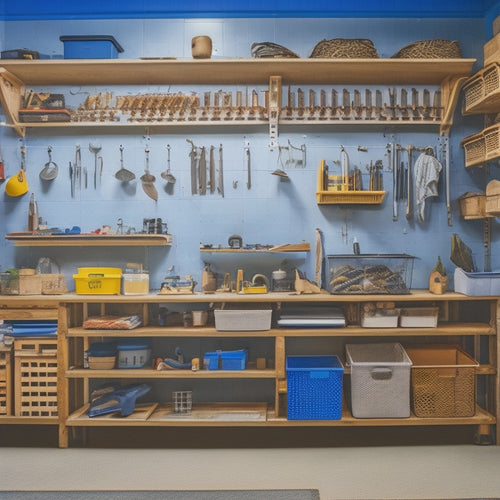
Why Drill Bits for Home Renovation Matter Most
Share
When tackling a home renovation project, you know that using the right drill bit is essential for achieving professional-looking results. The wrong choice can lead to premature wear, reduced efficiency, and even damage to your drill or materials. You'll want to take into account the type of material you're working with, as well as the size and shank type of the bit, to guarantee a secure fit and peak performance. Additionally, specialized coatings and concrete-specific bits can make all the difference in tackling challenging projects. By understanding the nuances of drill bits, you'll be able to tackle your project with confidence and achieve the results you're looking for - and exploring these factors further will help you make even more informed decisions.
Key Takeaways
• Correct drill bit material selection enhances efficiency, reduces wear, and ensures professional-looking results in home renovation projects.
• Accurate drill bit size measurement is crucial for effective drilling performance, and using a drill bit gauge provides precise measurements.
• Choosing the right shank type ensures a secure fit in the drill chuck, saving time and reducing frustration during home renovation tasks.
• Specialized coatings and drill bits designed for specific materials, such as concrete, optimize performance, extend bit life, and reduce wear.
• Using the right drill bit for the job prevents damage to materials, tools, and surrounding structures, ensuring a safe and successful home renovation.
Understanding Drill Bit Materials
When selecting the right drill bit for your home renovation project, you need to take into account the type of material it's made of, as different materials excel in specific drilling tasks and can greatly impact the bit's performance and longevity.
You'll find that drill bits come in various materials, each suited for specific applications. High-speed steel (HSS) drill bits, for instance, are ideal for drilling into wood, plastic, and soft metals, while cobalt steel bits are better suited for harder metals like stainless steel and titanium.
Carbide-tipped bits, on the other hand, are perfect for drilling into concrete, brick, and other masonry materials. Understanding the strengths and weaknesses of each drill bit type is vital in choosing the right one for your project.
By selecting the correct drill bit material, you'll guarantee efficient drilling, reduce wear and tear, and achieve professional-looking results.
Don't compromise on performance - choose the right drill bit type for your specific drill bit applications, and watch your home renovation project come together seamlessly.
Measuring Drill Bit Size
To guarantee accurate and efficient drilling, you'll need to measure your drill bit size correctly, as using a bit that's too small or too large can lead to poor performance, damage to the material, or even breakage of the bit itself.
Measuring drill bit size is essential, especially when working with various drill bit types, such as twist bits, spade bits, or hole saws.
To get it right, you'll need to use the correct measuring techniques. The most common method is to measure the diameter of the bit, which can be done using a ruler or caliper.
You can measure the diameter at the widest point, usually at the cutting edge. For more precise measurements, you can use a drill bit gauge, which provides exact measurements.
When measuring, make sure the bit is clean and free of debris to get an accurate reading.
Choosing the Right Shank Type
You'll need to select the right shank type to guarantee a secure fit in your drill chuck, as a mismatch can lead to vibration, wobbling, or even bit slippage during drilling operations. With multiple shank types available, it's crucial to understand their differences to guarantee shank compatibility. The three primary shank types are Straight Shank, Hex Shank, and SDS Shank.
Straight Shank bits are the most common and work with standard drill chucks. They're ideal for general-purpose drilling and are compatible with most drills.
Hex Shank bits, also known as 1/4' hex, have a hexagonal shape and are designed for use with impact drivers and cordless drills. They provide extra torque and are perfect for heavy-duty drilling.
SDS Shank bits, also known as Slotted Drive System, have a unique fluted design and are used with rotary hammers and SDS drills. They're ideal for heavy-duty masonry and concrete drilling.
When choosing a shank type, consider the type of drilling you'll be doing and the drill you'll be using. Selecting the right shank type will guarantee efficient and accurate drilling, saving you time and frustration on your home renovation project.
Coatings for Enhanced Performance
Drill bits with specialized coatings can greatly boost their performance, allowing them to drill faster, last longer, and resist wear and tear more effectively. When choosing a drill bit, you're not just selecting a tool, you're investing in the success of your project. The right coating can make all the difference.
Consider the following benefits of specialized coatings:
-
Titanium nitride (TiN) coatings reduce friction and heat buildup, allowing for faster drilling and increased tool life.
-
Titanium aluminum nitride (TiAlN) coatings provide exceptional wear resistance and hardness, making them ideal for drilling through tough materials.
-
Diamond coatings offer unparalleled cutting performance and are perfect for drilling through extremely hard surfaces.
- Ceramic coatings provide a durable, heat-resistant barrier that prevents drill bit wear and tear.
Specialized Drill Bits for Concrete
Your concrete renovation projects demand specialized drill bits designed to tackle the unique challenges of drilling through concrete's dense, abrasive composition. You can't rely on standard drill bits to get the job done efficiently and safely.
Concrete drilling techniques require a bit that can withstand the intense heat and friction generated by drilling through concrete. Specialized concrete drill bits are engineered with tungsten carbide tips and unique geometries to optimize performance and extend bit longevity.
When choosing a concrete drill bit, consider factors such as the type of concrete you're working with, the desired hole size, and the drilling technique you'll be using. For example, bits with a hammer drill design are ideal for drilling large holes in thick concrete, while diamond-coated bits are better suited for drilling precise holes in thin concrete.
Frequently Asked Questions
Can I Use a Drill Bit for Metal on Wood or Drywall?
You're wondering if you can use a drill bit for metal on wood or drywall.
The short answer is, it's not recommended. Metal drill bits are designed for high-speed, high-heat applications and can easily damage or split wood and drywall.
Instead, opt for woodworking drill techniques and bits specifically designed for the job.
Using the right tool for the task will guarantee a cleaner, more precise hole and prevent costly mistakes.
How Do I Prevent Drill Bits From Overheating During Use?
As you grip the drill, the whirring motor echoes through the air, and the drill bit spins like a tiny tornado, devouring wood or drywall.
But, beware! Overheating can render your drill bit useless.
To prevent this, you'll want to choose heat-resistant drill bit materials, such as tungsten carbide or cobalt steel.
Employ cooling techniques like frequent breaks, reducing drilling pressure, and using a cooling lubricant to keep your drill bit running smoothly and efficiently.
Are Drill Bits Dishwasher Safe for Easy Cleaning?
You're wondering if drill bits are dishwasher safe for easy cleaning. The answer depends on the drill bit materials.
High-speed steel (HSS) and cobalt bits can be damaged by the high heat and harsh detergents in a dishwasher. Instead, clean them with a soft brush and mild soap.
Titanium and tungsten carbide bits, however, can withstand dishwasher cleaning.
Always check the manufacturer's instructions for specific cleaning methods to guarantee your drill bits remain in top condition.
What Is the Average Lifespan of a Drill Bit?
You're wondering how long your trusty drill bit will last.
The average lifespan of a drill bit depends on the materials and sizes you're working with. High-carbon steel bits can last up to 50 holes, while carbide-tipped bits can handle 500-1000 holes.
Larger bits, like 1/4 inch or 1/2 inch, tend to wear out faster than smaller ones.
Proper maintenance, like cleaning and storing correctly, can also extend their lifespan.
Can I Sharpen Dull Drill Bits or Should I Replace Them?
You're wondering if you can sharpen dull drill bits or replace them. The answer depends on the type of bit and your drill bit maintenance habits.
For high-carbon steel bits, sharpening techniques like filing or grinding can revive their cutting edge.
However, carbide-tipped bits are more challenging to sharpen and might require replacement.
If you're unsure, it's often safer to replace the bit to avoid damaging your drill or surrounding material.
Conclusion
As you wrap up your home renovation, remember that drill bits aren't just an afterthought. They're the unsung heroes that can make or break your project's success.
The theory that 'a drill bit is just a drill bit' is debunked - the right material, size, shank type, and coating can greatly impact your results.
By choosing the perfect drill bit for the task, you're not just drilling holes; you're building a foundation for a sturdy and long-lasting renovation.
Related Posts
-

Create a Home Renovation Project Timeline in Excel
You can create a detailed home renovation project timeline in Excel by setting up a tailored template with separate w...
-

3 Best Planter Shopping Timeline Tips for Renovators
When incorporating planters into your renovation project, you'll want to plan carefully to avoid delays and guarantee...
-

7 Best Tool Storage Ideas for Home Renovation
When it comes to home renovation, staying organized is key to maximizing productivity and minimizing wasted time. To ...


